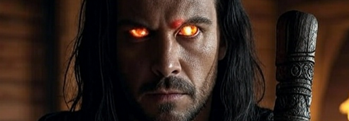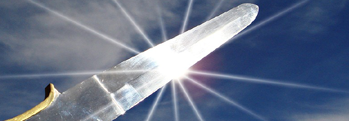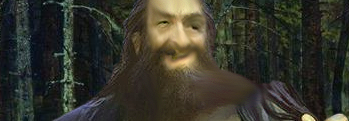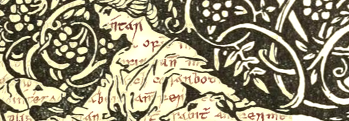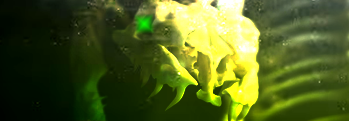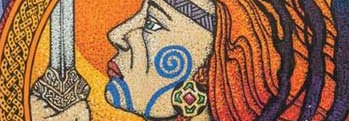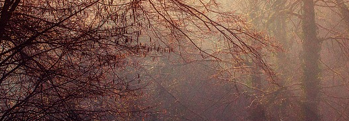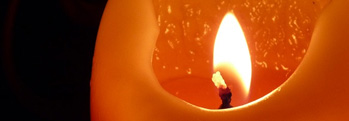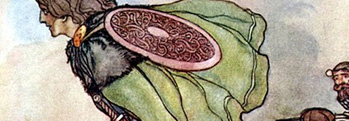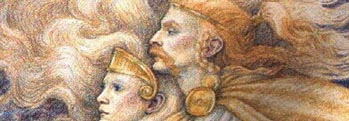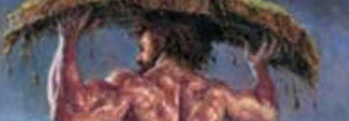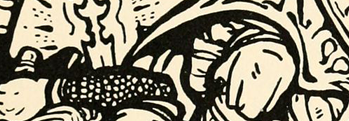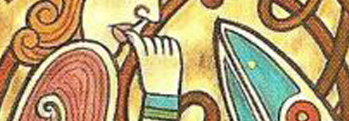Fionn and the Hag
Irish and Celtic myths and legends, Irish folklore and Irish fairy tales from the Fenian Cycle
Battle is done for the king's Dún
 Young Fionn Mac Cumhaill was out walking with his dog Bran one fine morning, and he happened to pass into a deep and thick dark wood of the kind that once covered all of Ireland, for the hunting was better there, when what did he come across but a thousand horses hauling timber and men chopping down the trees and preparing the logs.
Young Fionn Mac Cumhaill was out walking with his dog Bran one fine morning, and he happened to pass into a deep and thick dark wood of the kind that once covered all of Ireland, for the hunting was better there, when what did he come across but a thousand horses hauling timber and men chopping down the trees and preparing the logs.
"What are you up to?" asked Fionn of the workers, and they told him they were building a dún for the king, but they were running into trouble – every night it was being burned to the ground!
"The king has but one child, a daughter, and he has promised her in marriage to any man who can stop this arson from taking place. When the king dies the husband of his daughter will have it all, but beware! Any man who promises to save the dún and fails ends up in the king's dungeon, awaiting his judgement. It is said that the king will cut the heads off the lot of them in one sitting."
Fionn had the gift of illumination and true seeing which he could call upon by chewing his thumb, and chew his thumb is what he did. It came to him that there was a wicked old hag on the eastern side of the forest with her three sons, and each night one of them would go out and burn down the king's fortress.
"I will save the dún," said Fionn, to the general merriment and laughter of the workers.
"Better than you have tried and failed," they said, but Fionn went to the king anyway and got his permission to try his hand at the task. They ate and drank and shared stories, then Fionn chewed his thumb again and knew what to do.
Bran leaped up on top of the half built fortress and kept watch, waiting for the nightly visitors. Sure enough one of the sons soon flew in over the place, leaping from tree top to tree top, and with a single mighty bound he sprang over the entire edifice, dropping blazing torches on the thatching as he did so!
Quick as a wink, Bran nudged the torches over the edge of the roof until they landed with a splash in the flowing stream below.
"Who dares to quench my torches?" cried the son in fury, dancing and hopping like a madman.
"I dare," shouted Fionn boldly, and a ferocious battle ensued! Fionn was a mighty warrior but he was dealing with an uncanny creature here, and he'd have been in deep water himself if not for Bran's help – his loyal dog nipped, bit and tore at the son with marvellous swiftness, stripping the skin from his top to his toes.
Eventually Fionn triumphed and cut the head off his enemy, but the old hag was growing impatient waiting for her son's return. She told her second son to take more torches and go see what was taking his brother so long.
"Hurry back," she said "for the stew is almost done!" and you would not like to know what was cooking in that pot!
Away he went, and when he came upon Fionn they fought like demons again, and again Fionn was victorious, cutting the head from the shoulders of the second son. Had it not been for Bran he would have perished without a doubt.
By now the old hag was fairly steaming, so she sent out the eldest and strongest son who never ventured forth except in the greatest need. He had a cat's head and so was called Puss of the Corner. Swearing punishment and promising reward with the same breath, she sent him to hop over the trees with flaming brands held high.
He came to the site of the king's dún and like his brothers, threw the torches onto the roof, but they had only singed the straw before Bran knocked them into the stream again.
"Who has the gall, the brass, the cheek to interfere with my business this night!" bellowed Puss of the Corner, "show yourself fool, and die!"
"It is none but myself!" roared Fionn, and a third time that night battle was joined. Well if the first two were ferocious, they were nothing at all compared to this last fight, but with Bran's help Fionn again managed to cut the head off Puss.
To his surprise, that was not the end of it! For the horrible cat head stayed alive while the body lay still and dead on the ground, and nothing Fionn could do would shake it off or kill it. It gnawed and bit at Fionn, inflicting terrible wounds and dragging him around until he was ready to collapse with exhaustion, loss of blood and horror.
Again he chewed his thumb, the better to understand what he was dealing with, and he knew that the old hag was already on her way, bearing a vial of magical liquid which she could use to resurrect her three sons!
Fionn looked at Bran and Bran looked at Fionn, and they knew they were done for unless they could get some of her blood, which would shake off Puss.
Not long did it take before the hissing and snapping of the tree branches above told of the old hag's approach, and they watched her torches sail through the air to the top of the dún. Bran leaped up and knocked them into the water, and the old woman gave an ear-piercing shriek upon seeing all that had transpired.
Fionn crouched low and bunched himself into a ball, waiting for the hag to pass over him, then he sprang high in the salmon leap, Puss-head and all, and knocked the magic potion from her hands where it shattered on the stones below.
The hag gave a howl that could be heard from one end of the world to the other, causing milk to sour, flames to gutter out and grow cold, and a dreaful wind to whip over Ireland. Fionn and the hag fought harder than the three sons put together, but in the end and only by Bran's help was the hag's head chopped off just before dawn.
Fionn took some of her blood and rubbed it on Puss, who fell off dead, and then rubbed some more on his wounds and those of Bran, causing them to heal on the spot, and then he keeled over in a deep sleep.
The king's steward wandered along and saw that the dún still stood, and found Fionn fast asleep beneath it. Thinking quickly, he made his way back to the king's hall which was just awakening to the day's business, and cleared his throat.
"I have saved the dún and I claim my reward!" he declared and the king recognised his claim, making him prince and preparing for the wedding.
Bran saw and heard all of this and was greatly concerned, so she nipped and pulled and tugged and yelped at Fionn until he awoke. Rubbing his eyes, Fionn chewed his thumb and saw as clear as day what had happened.
Fionn went to the king, and said "I have saved your dun, and I claim the reward."
"Oh," said the king, "but my steward claimed the reward, and it has been given to him."
"He had nothing to do with saving the dún," said Fionn, "it was myself and none other who saved it!"
The steward came forth at this challenge and looked Fionn up and down very bold, for who was this vagabond boy to speak out against a man of good reputation and high standing such as himself?
"Did you save the king’s dún?" asked Fionn.
"I did," sneered the steward, knowing that a strut would serve him best.
"By my mystical thumb you did not, and here's your reward!" shouted Fionn, and and striking him with the edge of his open hand he swept the head off his body, smashing it against the other side of the room, flattening it like paste on the wall.
"Well," said the king, surveying the carnage "that is that, I suppose. Since you saved the dún my daughter will be your wife, but before you are married, I must cut the heads off all of the champions who tried and failed before."
Fionn asked to see these men, and went down to the cells where he found the mighty champions of Eriú. Then he went to the king and asked
"Will you give me the lives of these champions of Eriú, in place of your daughter’s hand?"
"That I will," said the king.
All the champions were freed and left the king's castle that day. Ever after they followed the orders of Fionn, and these were the beginning of his warrior-band and the first of the Fianna of Eriú.
The King's Dún may well have been the ringfort marked on the map below!
More Legends from the Fenian Cycle
Mongán mac Fíachnai was a prince of the Gaels, none other than he whose father was Fíachnae mac Báetáin, and it was about the seventh century in Ireland when he ruled over Ulster. Many are the tales told of him and his royal reign, with some even whispering that he was the son of Manannán mac Lir, ancient G ... [more]
The Corleck stone head is believed to be an ancient pagan idol, representing perhaps some ancestor or deity from the pre-Christian era in Ireland. The most striking aspect of the Corleck stone head is its three faces, set in strange, almost unsettling expressions, all the more remarkable for their simplicity of design, lacking ears or detailed feat ... [more]
The Clonoura shield was discovered standing upright in a bog in Clonoura, county Tipperary and represents one of the very few fully intact Iron Age shields that have ever been found. It is marked with many slash and stab scars from knives, swords, spears and other sharp weapons, and dates from 30 to 60 AD, pre-Christian Iron Age Ireland. It is q ... [more]
The days of the heroes of the Fianna have captured the imaginations of many throughout the ages, and one such was the ninth century poet Gofraidh Fionn O’Dalaigh, one of the finest poets in all of Killarney and all of Ireland. For it was his pen and none other that first put quill and ink to parchment and recorded the old story of Reicne F ... [more]
It was a fine day in Ireland many years ago when Fionn and his Fianna took a fancy to go out hunting. Warm was the sun amid the whispering glades of ancient forests, gentle was the breeze and sweet the scent of summer flowers in its bosom. Sweeter yet was the sight of a mighty deer to the eyes of the hunters, and so they gave chase, howling with de ... [more]
It was in the days of Fionn and the Fianna, a very long time ago in Ireland, that the people of Ben Edair decided to hold a festival, a Feis or Aonach, to celebrate the season. All of Fionn’s hosts were gathered, the seven ordinary warbands and the seven extraordinary warbands, and they danced and played music merrily with the people. Then ... [more]
There are few these days who have not heard of Fionn Mac Cumhaill, hero and defender of Ireland, or at least might recognise his name. But there were no creatures that Fionn loved amongst his three hundred dogs more than his two favourites, Bran and Sceolan, meaning Raven and Survivor, and though it’s a stranger story than most, this is the t ... [more]
It is not unusual for stories in the Irish legendarium to have more than one meaning besides that of a literal recounting of historical events, whether by accident or by design. Some tales were meant to be understood in the context of the era and culture of the story teller, while others might instruct in certain arts, and yet others contain myster ... [more]
Those monks who recorded the mythologies and folklore of Ireland which had previously been passed down by word of mouth from bard to druid to bard for countless generations were, by their very nature, devout Christians. As Christians they were dedicated to not only God and His Church, but to the people who bore and nurtured them, and everywhere the ... [more]
One day Fionn Mac Cumhaill, doughty hero of Ireland, and his friends Goll, Cialta and Oscar, as well as others of the Fianna, were resting after the hunt on a certain long hill now known by a different name. Their meal was being made ready, when what should happen only a girl of the kin of the giants came striding up and sat down among them, a grea ... [more]
Something which often appears in the most ancient tales of Ireland is the grisly vision of heads which speak after being separated from their bodies! This was said to be an art of the druids inherited from the necromancy of the Dé Danann, who were themselves said to be able to raise a whole army from the grave to fight again day after day! ... [more]
There once was a young fellow called Conall, and he lived with his parents in the east of the country. They lived a quiet life, catching fish and digging up oysters for meat and lamps, but one dark day the Fomors came and demanded tribute. Having none to give, his father bid the sea demons begone, but instead they made to take himself and his famil ... [more]
Young Fionn Mac Cumhaill was out walking with his dog Bran one fine morning, and he happened to pass into a deep and thick dark wood of the kind that once covered all of Ireland, for the hunting was better there, when what did he come across but a thousand horses hauling timber and men chopping down the trees and preparing the logs. "What a ... [more]
There was a mighty warrior in the west of Eriu, and Cumhal Mac Art was his name. Feared was his axe and he could skewer two men with a single cast of his feathered war-dart, and yet for all that he lived a lonely life, and a life of fear – for it had been foretold that should he ever marry, he would die in battle the very next day! But all ... [more]
It was in the day of Fionn Mac Cumhaill when he was an old man, yet still hale and hearty, that one of his warriors, whose name was Diarmaid son of Donn and grandson of Duibne, had carried off his young bride-to-be, Gráinne daughter of Cormac! The two had fallen in love and Gráinne, for all of Fionn's fame, wanted nothing to do wi ... [more]
One warm summer's day Fionn and his men were out hunting through the darkling forests of Ballachgowan in Munster, chasing deer and boar through the gloomy glades, when they stopped short all of a sudden and came face to face with a startling sight! For what had stepped between them and their prey but a strange, damp giant of a man. Black wer ... [more]
Fionn Mac Cumhaill stood at the door of his hunting lodge with his fists on his hips, his heart sinking as he realised his intentions to hunt for deer this day were lost in the waves of mist and fog that had rolled in from Dublin bay, although at that time it was known by a different name. It had come as far inland as Gleann na Smol, the Glen of th ... [more]
When Fionn Mac Cumhaill became leader of the Fianna, the fiercest and most warlike of those bands of heroes who lived in the wild places, hunting and acting as champions for their kings, and defending Ireland from evil, he decided that he wished to have only the best warriors to follow him. So he sat down and sucked his thumb to taste the wisdom ... [more]
Close by where Limerick city stands today lie the ruins of an ancient and once mighty fortress called Carrigogunnel, which commanded all the lands about with a stern hand. It was known then as a place of ill omen, and it is known today as the same, for it was once the home of an uncanny hag by the name of Gráinne. Amid the surrounding mar ... [more]
A dark horde of fell-handed warriors approached Ireland, sails gathered off the coast like storm clouds, billowing out in the gusts of uncertain wind, while oars bent to the rolling thunder of drums. Fierce indeed was the host of King Colgan, master of Lochlainn, and he came to make war on Cormac Mac Airt, High King of Ireland! As soon as Fionn ... [more]
Diarmuid the Fair, son of Donn or Duibhne of the Tuatha De Danann was one of the Fianna, the great warriors of ancient Ireland who protected the land from dangers near and far. It was said that no woman could resist his gaze, for he'd been granted the blessing of comeliness by the Ghost Queen Morrigan after he helped her out of a spot of bother ... [more]
Fionn Mac Cumhaill and the rest of the Fianna were resting after a great battle, weary and sore with sorrow at the loss of their fellows, when they spied coming along the shores of Loch Lein in County Kerry a beautiful young woman riding a swift horse, so swift indeed that its hooves scarcely seemed to touch the ground! Now although the women of ... [more]
Now it is known by some that the fairies of Ireland weren't much like the fairies we hear about in these latter days, harmless things of mischief and frolic, but were instead respected and often feared, for their anger was quick and their kindness was whimsical. Some would join men in battle, and some would make war on men, others were omens of ... [more]
It was a fine brisk spring morning in Ireland when Fionn Mac Cumhaill decided to take himself for a stroll along the white sandy beaches of the seashore, the better to breathe the air and enjoy the simple pleasures life had to offer. But that morning, life had more to offer and it didn't look pleasant, for it was a giant bearing down on the bea ... [more]
Fionn MacCumhaill was well known as a fair and handsome man, but his most distinguishing feature was his grey hair - and he was not born with it! Fionn was one time out on the green of Almhuin, and he saw what had the appearance of a grey fawn running across the plain. He called and whistled to his hounds then, but neither hound nor man heard hi ... [more]
After his seven years of training with the poet Finegas were done, Fionn Mac Cumhaill took himself from the river Boyne to the great hall of the High King in Tara, Conn of the Hundred Battles, to present himself there as a member of the Fianna, the very best of the best warriors throughout Ireland. Announcing himself, Conn took him into the band an ... [more]
Here is the story of how Fionn MacCumhaill gained the knowledge of the world. And wouldn't it be a great thing to know it all? Still, knowledge and wisdom must be balanced, and this was known to the young man called Fionn, which means fair and bright. He was fleeing from the warriors who had murdered his father when he came upon the hiding plac ... [more]




